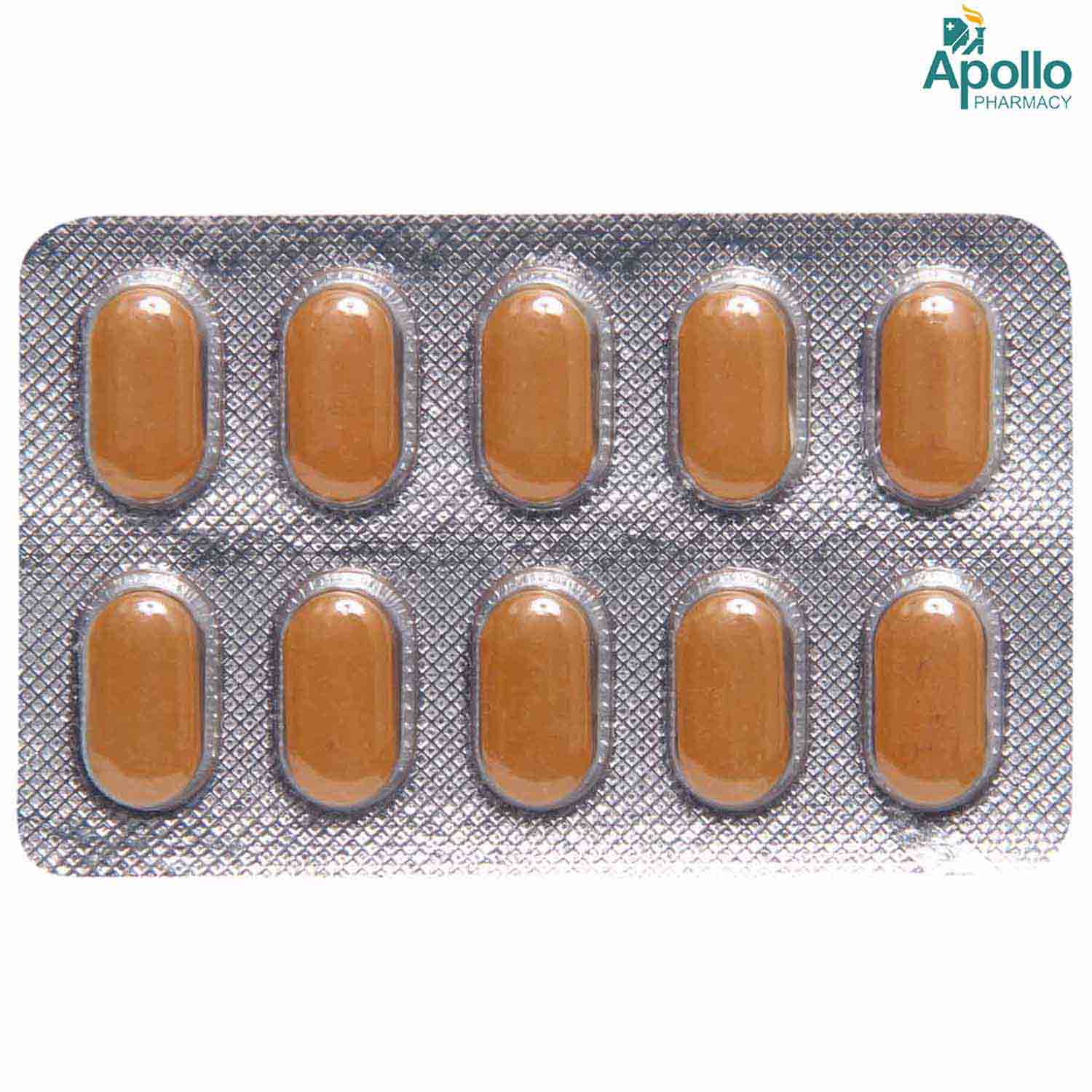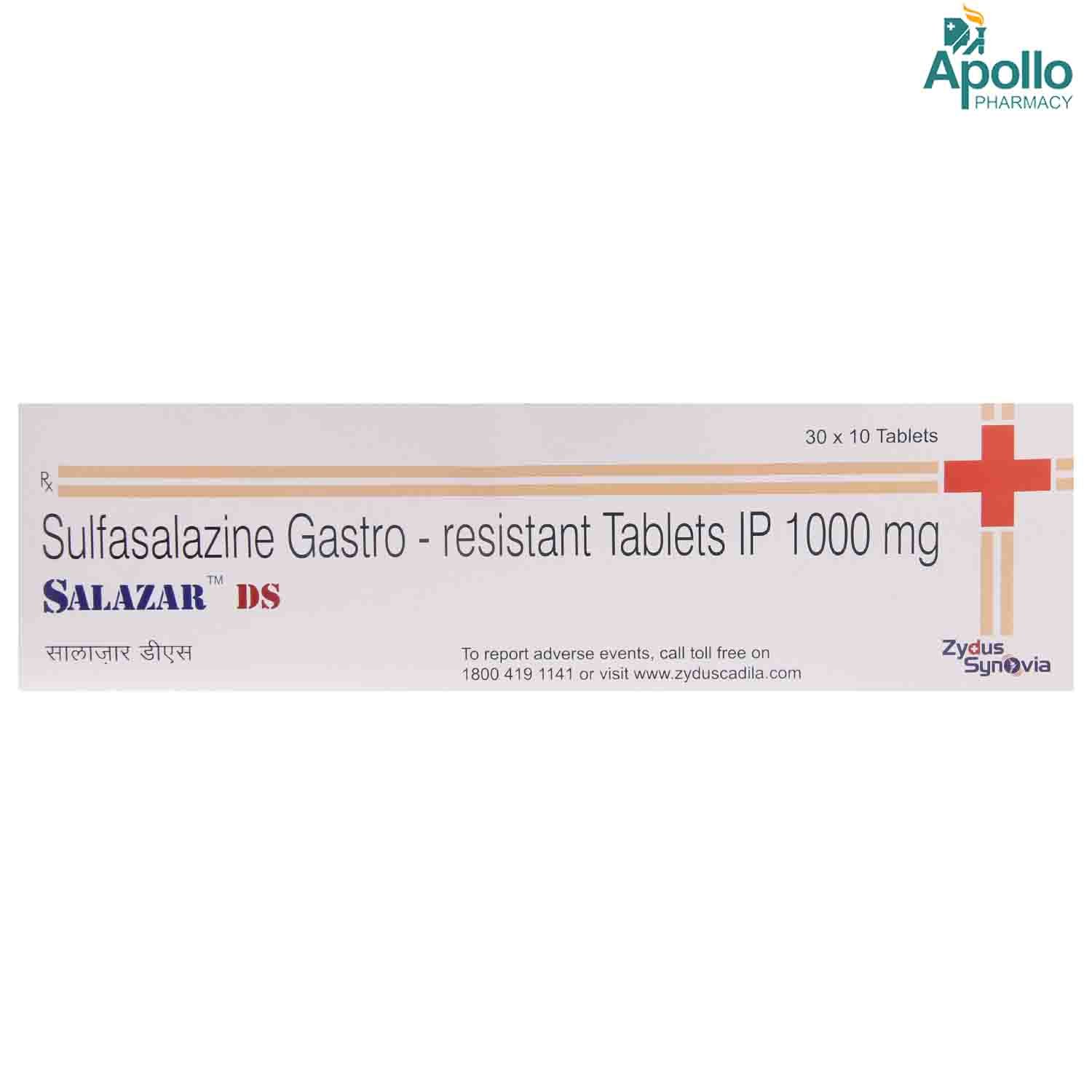Sulfasalazine
About Sulfasalazine
Sulfasalazine belongs to a class of anti-inflammatory medicines known as ‘aminosalicylates’ and ‘disease-modifying anti-rheumatic drug’ (DMARD) which treats bowel diseases (ulcerative colitis, Crohn's disease), skin-related problems (psoriasis), and chronic joint diseases (rheumatoid arthritis, ankylosing spondylitis) in the children and adults.
Sulfasalazine works as an inflammation reducer by acting locally, inhibiting the formation of a chemical known as prostaglandins which control pain and inflammation. Together it helps reducing the inflammation of the intestine, skin, and joints.
Your doctor will advise you on how often you take your tablets based on your medical condition. In some cases, you may experience a sore throat, a fever, unexplained bruising, or ringing in your ears (tinnitus). Most of these side effects of Sulfasalazine do not require medical attention and gradually resolve over time. However, if the side effects are persistent, please reach out to your doctor.
Sulfasalazine can also lower your sperm count leading to a temporary decrease in male fertility. In this case, you can speak to your doctor. Your doctor might arrange a blood test before you start taking Sulfasalazine. You can continue taking Sulfasalazine to prevent flares up during the pregnancy. Besides this, your doctor may prescribe additional folic acid supplements during pregnancy because Sulfasalazine may reduce the level of folic acid in your body. Sulfasalazine can be safely taken while you are breastfeeding unless the baby is premature or at risk of jaundice.
Uses of Sulfasalazine
Medicinal Benefits
Sulfasalazine works by reducing the inflammation in the colon. It inhibits the formation of a chemical, prostaglandin which controls inflammation. Together it helps in reducing the inflammation at all the sites like joints, skin, and bowel (intestines) thereby treating a wider range of joint, skin and bowel diseases including ulcerative colitis, Crohn's disease, rheumatoid arthritis, ankylosing spondylitis, psoriatic arthritis, juvenile idiopathic arthritis. Sulfasalazine is not a pain killer rather it is an anti-inflammatory.
Directions for Use
Storage
Side Effects of Sulfasalazine
- Headache
- Indigestion
- Nausea
- Watery diarrhoea
Drug Warnings
Sulfasalazine treatment is generally considered to be safe during pregnancy, but its usage in pregnant mothers should be discussed with the doctor if planning for pregnancy. This medication should be avoided in breastfeeding mothers as it passes into the milk and causes jaundice and brain problems in infants less than 2 years of age. Tell your doctor if you have an allergy to any other sulpha drugs (sulfonamide antibiotic) as it may cause serious skin allergies like urticaria and stevens johnson’s syndrome. In men, an intake of Sulfasalazine may lower the sperm count, which improves after stopping this medicine. Tell your doctor if you have asthma, wheezing, fever, breathing difficulties, sudden severe skin rash, unusual bleeding, sore throat, fever, unexplained bruising, or any other symptoms of infection. Use of Sulfasalazine may change the colour of your urine, contact lenses, and tears to yellow/orange and even make your skin more sensitive to the sunlight. But, this is normal, harmless, and nothing to worry about. You may low folic acid in pregnancy while taking Sulfasalazine so your doctor might prescribe you iron or folic acid supplements.
Drug Interactions
Drug-Drug Interaction: Sulfasalazine may interact with blood thinner (warfarin), heart disease medicine (digoxin), iron supplements (folate), anti-diabetic medicine (glimepiride, glyburide, glipizide, antibiotics (methenamine), immune system affecting drug (azathioprine, mercaptopurine), anti-arthritis or anti-cancer drug (methotrexate) and anti TB drug (isoniazid).
Drug-Food Interaction: No relevant interaction be found.
Drug-Disease Interaction: Sulfasalazine should not be given to the people affected with colitis intestinal obstruction, urinary obstruction, hematologic toxicity, hypersensitivity or allergic reactions, liver disease, porphyria and kidney disease.
Drug-Drug Interactions Checker List:
Safety Advice

Alcohol
unsafeIt is not recommended to consume alcohol while taking Sulfasalazine to avoid unpleasant side-effects.

Pregnancy
cautionSulfasalazine should be recommended in pregnancy only if required. In case, if prescribed to a pregnant woman, it is advised to increase the folate supplementation after consulting your doctor.

Breast Feeding
cautionSulfasalazine is excreted in breastmilk and is not recommended especially if the baby is premature or is at the risk of jaundice. It might cause kernicterus (excessive levels of bilirubin in the blood) in the new-born.

Driving
safe if prescribedSulfasalazine does not affect the ability to drive. However, if you feel drowsy after taking Sulfasalazine, it is advised not to drive.

Liver
unsafeSulfasalazine is not recommended to use in patients suffering or having a history of liver diseases. In other people, rarely it can cause hepatitis (inflammation of the liver).

Kidney
unsafeSulfasalazine is not recommended to use in patients suffering or having a history of kidney diseases. In other people, rarely it can cause inflammation of the kidneys.

Children
safe if prescribedSulfasalazine should be advised in children only if prescribed by a child specialist.
Habit Forming
Diet & Lifestyle Advise
- It is advised to drink plenty of water to prevent the occurrence of kidney stones.
- Take low fibre foods such as white rice, white pasta, bread, egg, fish, tofu, butter, etc. to avoid triggering ulcerative colitis.
- Exercise regularly to suppress inflammation in the body.
- Manage stress by doing meditation and deep breathing exercises.
- Eat smaller meals to avoid pain in the stomach.
- Avoid foods that can increase or worsen ulcerative colitis such as milk, milk products, raw fruits and vegetables, beans, spicy foods, popcorn, artificial sweeteners, nuts, seeds, and fatty foods.
Special Advise
It is advised to drink plenty of water to prevent the occurrence of kidney stones or crystalloids.
Patients Concern
Disease/Condition Glossary
Ulcerative colitis: It is an inflammatory disease of the bowels that causes irritation, inflammation, and ulcers in the lining of the large intestine (colon).
Crohn’s disease: It is an inflammatory bowel disease (IBD) characterized by inflammation of the digestive tracts.
Psoriasis: It is a skin disease in which our skin cells start multiplying faster building up bumpy red patches covered with white scales.
Rheumatoid arthritis and Ankylosing spondylitis: They are the most common rheumatic diseases affecting joints and the spine leading to chronic inflammation and painful condition ultimately leading to disability.
FAQs
Yes, Sulfasalazine is contraindicated in patients with intestinal or urinary obstruction, patients with porphyria (liver disorders), and patients hypersensitive to sulfasalazine, its metabolites, sulfonamides, or salicylates.
Yes, Sulfasalazine is said to affect fertility in males as it can cause a fall in sperm count. However, it is only affected by the time this medicine is taken.
Yes, Sulfasalazine is safe to use in breastfeeding. However, please inform your doctor if the baby is premature or is at risk of jaundice as this medicine might not be advised in such cases.
Yes, Sulfasalazine can affect the blood count but it is rare. There is a decrease in the number of white blood cells (infection-fighting cells). In some cases, the bone marrow might completely stop producing a specific type of white blood cell, this condition is known as agranulocytosis. It occurs within two months of starting this medicine and might be accompanied by symptoms such as fever and rash. This condition resolves within one or two weeks after this medicine is discontinued.
No, Sulfasalazine is a disease-modifying anti-rheumatic drug’ (DMARD) and not a painkiller. So, if you are taking a painkiller before starting this medicine, you can continue taking it along with Sulfasalazine.
No, Sulfasalazine should be taken in the dose and duration as advised by the doctor. If you take it in more than the recommended dose, it might cause unpleasant side-effects. If you think your symptoms are not improving, please consult your doctor.
Sulfasalazine in rare cases may cause blood disorders so your doctor may ask you to have blood count, electrolytes, urea, creatinine, and liver function tests every 3 months for the first year and every 6 months next year onwards.
If well tolerated you should take a prescribed dose of Sulfasalazine while the disease remains in remission. Do not stop taking your medicine unless your doctor tells you to do so.
Sulfasalazine may cause central nervous system adverse effects such as serious psychiatric problems including mania, depression, and psychosis, and these symptoms have been reported to occur only infrequently.




